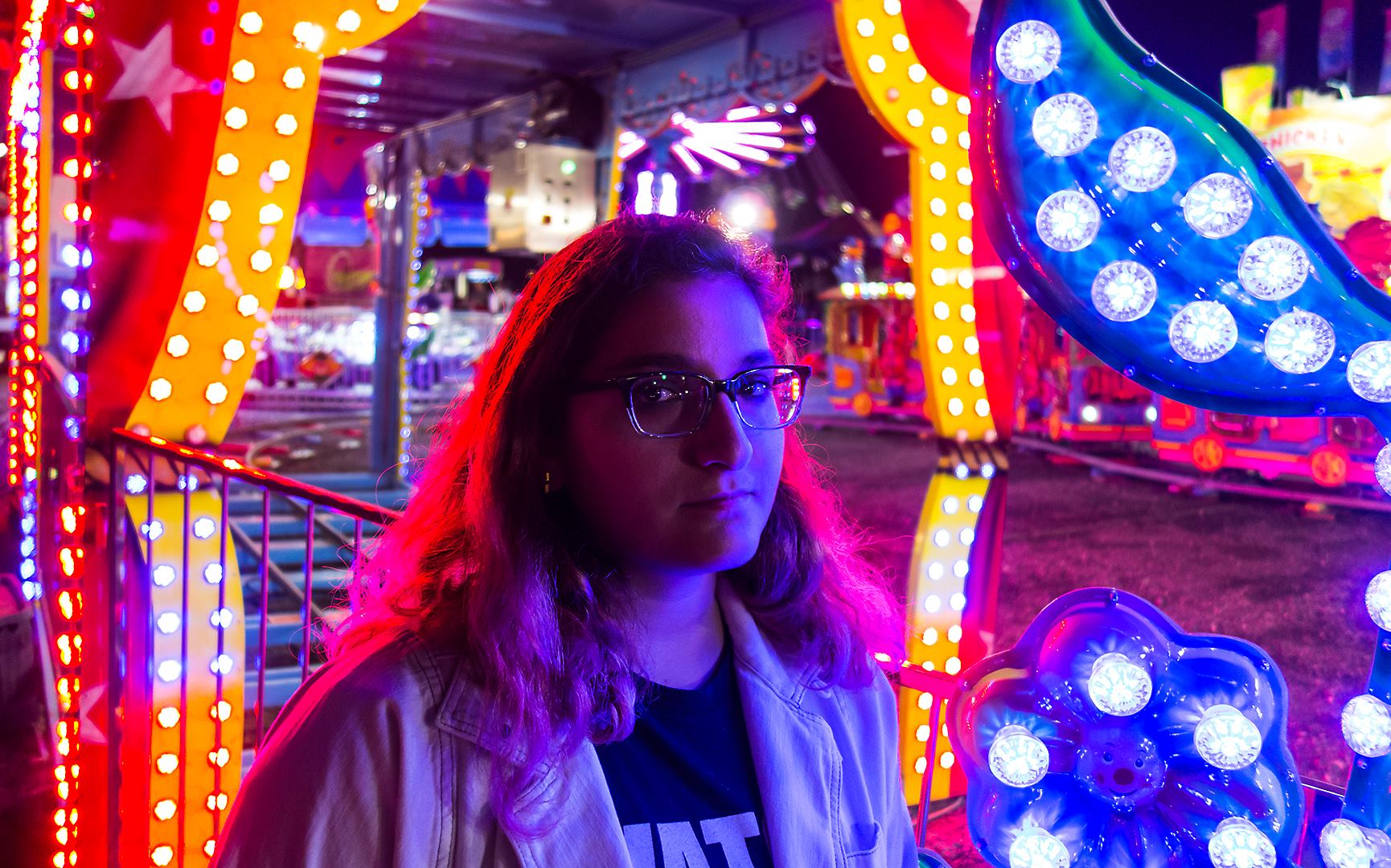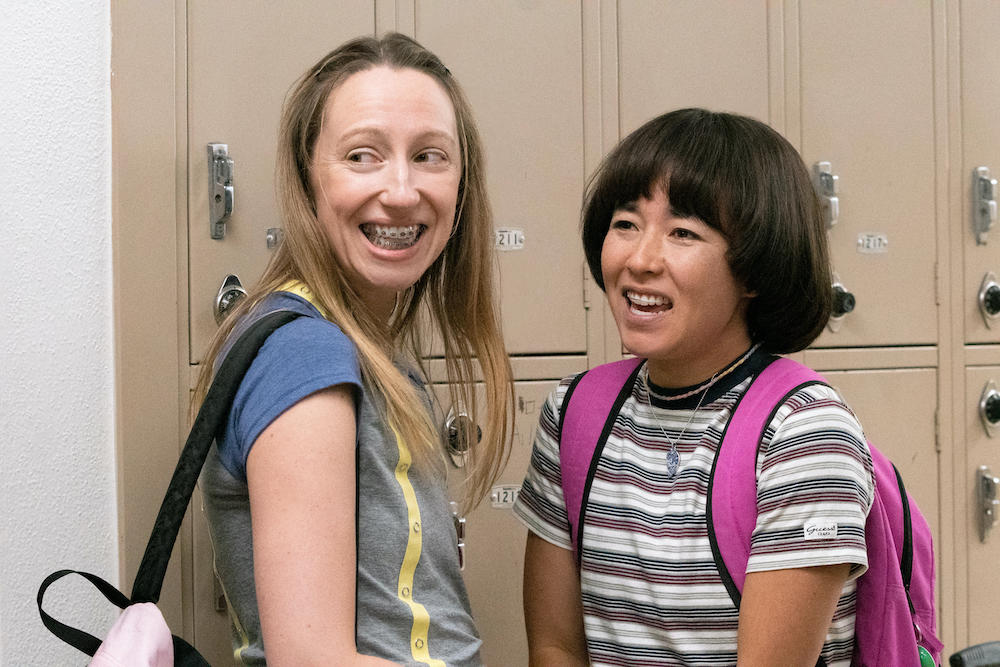It no longer feels accurate to describe “PEN15” solely as a cringe comedy. The second season of the show in which 30something co-creators Maya Erskine and Anna Konkle play middle school versions of themselves still thrives on deeply uncomfortable situations that tap into our collective adolescent shame. (If you thought the first season’s masturbation episode couldn’t be topped, get ready for a mocking game of keep-away with a bloody sanitary pad.) But what seems to resonate more intentionally in this second season, which will be available on Hulu on September 18, is how loyal these characters are to each other, how heartfelt their bonds are, and how willing they are to forgive.
Just as Maya (played by Erskine) and Anna (played by Konkle) have grown, so too has “PEN15,” which leaves behind some of the first season’s more predictable storylines for nuanced considerations of the myriad pressures placed upon teens by their friends, their parents, and themselves. That’s not to say the show has lost any of its zany humor; Erskine and Konkle are still inexplicably wonderful at capturing the endlessly awkward physicality of adolescence. But their wackiness is complemented by subplots about sexual identity, toxic popularity, and classist consumerism that push “PEN15” into new directions.
Set in 2000, the first season of “PEN15” introduced best friends and fellow outcasts Maya and Anna and focused on their year in seventh grade: their rivalries, their crushes, and their friction with their families. The second season starts during summer break, before eighth grade begins. Weeks have passed since the school dance where Maya and Anna went into a closet with the school’s star wrestler and most popular guy Brandt (Jonah Beres), allowed him to touch their breasts, and then vowed to keep the experience a secret. Anna, concerned with her parents’ separation and impending divorce, hasn’t thought much about the “threesome”—but Maya, convinced that she’s in love with Brandt, has talked about him all summer.
Perhaps in a nod to Bo Burnham’s similarly themed film “Eighth Grade,” premiere episode “Pool” takes place during a pool party that Anna, Maya, Brandt, and Anna’s ex-boyfriend Brendan (Brady Allen) all attend. “No offense, but I think we’re too good for it,” Maya says, but then she’s swimming up to Brandt in the pool, following him into a bedroom, swearing that she’s not stalking him, apologizing for bothering him—and hoping he might touch her again. (What Erskine, Konkle, and co-creator and director Sam Zvibleman especially nail this season is the way young women are conditioned to apologize for their very existence, expressing regret for practically every demand, desire, or opinion.) While Maya chases Brandt and Anna tries to tamp down her attraction to fellow popular guy Alex (Lincoln Jolly), who rejected her last season, their reputation at school takes a tumble. “You were so desperate,” a classmate tells them during a gym class where other girls also call Maya and Anna sluts, and eighth grade isn’t getting off to a particularly promising start.

“Pool” sets up a variety of relationship dynamics, both at home and at school, which the next six episodes steadily explore for Maya and Anna. Maya’s fixation on Brandt shapes practically everything. Second episode “Wrestle” starts strong with an opener straight out of a ‘70s paranoia thriller, with Maya watching Brandt from the school’s roof, while the girls’ flirtation with “The Craft”-style witchcraft in “Vendy Wiccany” includes Maya trying to cast a love spell. Erskine does solid work throughout as the increasingly anxious Maya is gaslit by Brandt and confused about her own feelings, and some of her reactions—particularly one of gut-wrenching devastation—really land. In contrast, Anna’s arc over the first half of the season is primarily reactive, but Konkle almost evokes “Bill and Ted”-era Keanu Reeves in how easily she can shift between earnest sincerity and surprised sadness. Her parents’ constant fighting, her classmates’ bullying, and Alex’s disinterest are all motivators, and they relate to a piece of advice that Anna spends these first seven episodes trying to embody: “Life can pummel you down. … Learn how to pummel back.”
Despite the Brandt focus, the standouts of this second go-round for “PEN15” exist outside of the eighth-graders’ (mostly failed) romances. As usual, the attention to turn-of-the-century detail is a nostalgia bonanza; for millennials who are in the same age range as the 33-year-old Erskine and Konkle, the references are almost too overwhelming to count. Song choices from Will Smith, Sophie B. Hawkins, and Vitamin C; magazine cutouts of Devon Sawa, Freddie Prinze Jr., and Heath Ledger on the girls’ walls; three-way calls; duct-tape wallets; beepers; Surge soda; Tommy Hilfiger T-shirts and Kangol hats. Those details are incorporated in ways that make narrative sense for each episode, in particular in season highlights “Three” and “Sleepover,” in which the manipulative Maura (Ashlee Grubbs) tries to become Maya and Anna’s new best friend. How the girl plies them with expensive gifts and name-brand snacks builds further friction between Maya, Anna, and their respective mothers, and raises questions about how often we mistake having wealth for having a personality.
The gross-out stuff is still around, although intermittently: a close-up of a booger; Anna saying that she would use any magic powers they develop to create an invisible glove that could pull farts out of Maya’s butt; a surprisingly graphic scene involving age-inappropriate breastfeeding. But one of the show’s quietest subplots, in which one of Maya and Anna’s classmates begins to reconsider his sexual orientation, hits hardest. And for as much as “PEN15” revels in fantasy sequences (a montage showing Anna and Maya bulking up into bodybuilders; a scene where Anna howls at the moon like a werewolf; a fourth-wall-breaking monologue by Maya as she practices for the school play), the show’s most impactful moments so far this season are the ones that reaffirm loyalty and love. An embrace between Maya and Anna after Anna’s home situation takes a turn for the worse, or Maya defending her mother to a xenophobic classmate. These girls haven’t changed—they can still be selfish, and they can still demonstrate a staggering amount of innocence (like when Anna snarls, “You cannot be someone else on AIM. It’s illegal!”). But “PEN15” grows in its second season by imagining all the answers Maya, Anna, their family, and their friends could provide to questions like, “Who cares what others think? Are you alright?” The show is better for that expansive perspective but personalized character focus, and Erskine and Konkle remain infinitely watchable.
Seven episodes screened for review.












